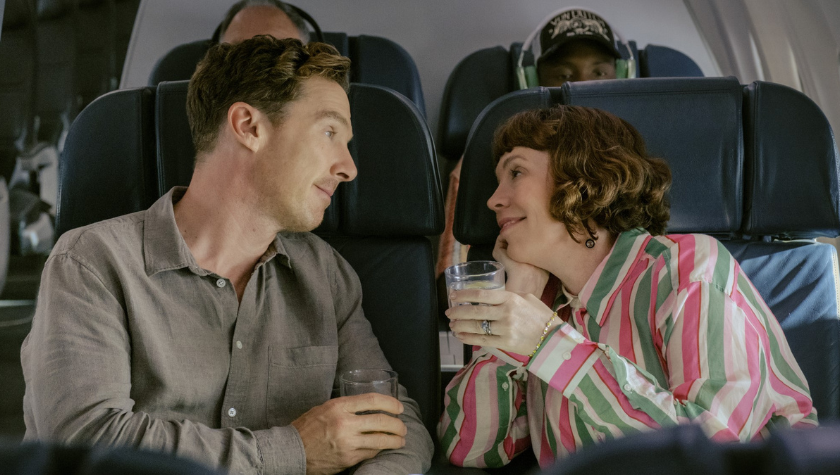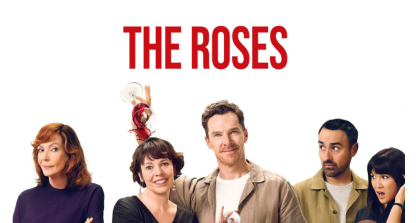I, like many people, have been a fan of Tony McNamara’s witty, biting work for several years.
The screenwriter and playwright has gained fame for his diverse, fanciful stories, featuring colorful characters in even more colorful conflicts. The words that tumble out of their mouths are often shocking or obscene. It makes for punchy, unique comedy.
McNamara is twice Oscar-nominated for the delightful Poor Things and The Favourite, both part of his collaboration with director Yorgos Lanthimos. He also wrote The Great, a historical comedy about Catherine the Great, which was taken from us too soon.
He’s gathered additional accolades for projects like The Rage in Placid Lake (which he also directed) and the Disney origin story Cruella.
His newest project is The Roses, a comedy directed by Jay Roach, a retelling of the 1989 black comedy The War of the Roses. Starring Benedict Cumberbatch and Olivia Colman as Theo and Ivy, the story follows a marriage on the verge of collapse.
McNamara takes the audience through the building tension of this relationship to an explosive (and hilarious) conclusion, while also finding touching kernels of truth in their conflict - exactly the kind of writing he’s best at.
We spoke with McNamara about the film and got some of his best advice for screenwriters. If you want to write fun, character-driven comedy, this is the post for you.
Editor’s note: The following conversation has been edited for length and clarity.
Final Draft: In this film, you have two characters who are deeply in love, but they do terrible things to each other. How do you convey that duality in your writing?
Tony McNamara: I think I always try to look at real basics of where they’re coming from. I feel like if you’re always writing from some emotional truth of why people want stuff, and how they’re going to go about it, it might not be the best version of going about it as a human being. It can be quite flawed. But as long as you understand that these two, they’re not very good at marriage, but they want it to work. They’re desperately trying a lot of the time, but they’re quite bad at trying.
You’re just watching people who are flawed trying to get something. Which we all are. I feel like you give them a bit of a pass on some of their behavior because of it.
Final Draft: Your dialogue is amazingly sharp, but it manages to get these emotional gut-punches in there as well. How do you find those moments for those barbs?
Tony McNamara: I think I try and know what everyone’s about. I’m very tonally driven and rhythm-driven. I know that within the rhythm of a scene, there will be moments that take off out of the rhythm that provide more of a punch. A lot of it’s character driven, of where they’re at.
It is then organizing the scene so that you’re surprising the audience with where they get to. But you’re also like, “Oh, well, of course they said that.”
Final Draft: You also have a really pivotal table scene in this movie, which you wrote in an afternoon, I believe.
Tony McNamara: Yeah. It was one of those things that I think as a writer, sometimes you get it free. I think it was built on all the work of the previous 70 pages and drafts. I’d already done a bunch of drafts of the script.
I think it’s one of those things when you’re writing a script that’s set over 20 years, they’re quite difficult. And all the sequences before were bunches of scenes set across a couple of weeks or a month … I think the playwright in me went, “I just want to write a big long scene.”
I wanted a scene where they were in one place for a bunch of time and you really understood where they were, and that they’d been holding it together, and they finally couldn’t.
And I went, “I’ll just do it as a quick three acts over 14 pages or something and see if it works.” I wrote it out really quickly and showed it to my best friend who was a writer on The Great, and she was in my office and I said, “Read this. I feel like it’s good.”
And she was like, “That’s great.” I think it was all built out of a bunch of drafts where that didn’t happen and I hadn’t quite solved how to shift gears and make the rhythm jump up a notch. But yeah, it was like, I got one free for the writing gods for an afternoon.
Final Draft: Well, it’s an amazing scene, and table scenes can be notoriously difficult to write. So it sounds like you approached it with that three-act structure in mind. Are there any other ways that you would recommend attacking a big table scene?
Tony McNamara: No, I think that’s partly it. I’ve written a bunch of them in The Great and other things, and theater, because I started as a playwright, that were very table scene-y.
I think it was like, “Oh, it’s trying to find a structure,” because they can easily run into just dialogue for no real purpose or get off-line easily.
I think I was just very conscious of it [being] three acts, and I knew how it started. I think what I felt good about was, I went, “Well, it starts pretty cool and everyone’s pretty chill, and then the table scene is insane.”
And then there’s the aftermath, which was the scene I really cared about emotionally, but we couldn’t get there without the middle scene. That was the fun bit.


Final Draft: How do you approach mapping out the deterioration of their relationship through the whole film?
Tony McNamara: Trial and error. The 20-year period is hard. It’s such a long time. But in a way that becomes slightly your friend. Because you’re building, “Okay, they’ve completely fallen apart here and it’s completely over here, and they’re trying here.”
You just map it out. Then, because I’m very conscious of dialogue, I will change their language throughout. Their banter is rhythmically the same throughout the movie, but there’s a lightness to it at the start and an ease, and then it gets tougher.
So that was part of it. I was like, I’ll change how they speak to each other. And the rhythm, it’ll be similar. They’ll banter, but it’ll be crueler and a bit tougher. And then they’ll lose it all together.
Final Draft: Which is so gratifying to see at the end. That whole finale is just so amazing to watch.
Tony McNamara: Yeah, it’s fun.
Final Draft: You’ve said that you’ve written your first drafts by hand. What’s your revision process?
Tony McNamara: I always write drafts by hand, and then my revision is typing it up. So it’s like two drafts in one. I write it in long hand. [It’s] basically a psychological trick. I can’t really read my handwriting. I don’t know if it’s good or not.
I’ve tried going straight to the typewriter, and I’m too conscious of what it is, and I hate everything I write. So if I scribble it out, then I’m typing it up, so then I’m revising. It’s not really my fault what that guy wrote on the pad, and so I’m just typing it, and then I revise it as I type it, and it just seems to work for me.
So every writer has to find their process where they trick themselves, get out of the psychological torture of it all.
Final Draft: It’s wild to me that you are also at a point as a writer early on where you’re like, “I hate this, and I don’t know if this is good or not.”
Tony McNamara: I’m still at that point sometimes. So now I try to go, “Well, it’s okay. You’ve got a career, people pay you.” But I think it’s hard when you’re a writer not to be too judgmental. So sometimes writing on a pad, I’m less judgmental, so that’s why I do it.
Final Draft: Is there one bit of advice that you would give an aspiring writer?
Tony McNamara: I think I would just say make sure you love your craft and the process of craft, and don’t get too hung up on the business or trying to solve the business.
I think people try and solve the business. And the business is unsolvable, because it’s a completely movable feast. We’re in the golden age of TV, and then we’re not. I don’t think you can do anything but, from my point of view, I just try and enjoy writing, and if you can get a gig, then enjoy the process of writing, enjoy learning about your craft, and you’ll probably be all right because you’ll be a good writer.
But I think the business is tough, and it’s a hard business to wrap your head around, and I feel like it’s easy to get too caught up in that side of things and not enough in just enjoying being a writer and enjoying the craft of trying to work out how things are better and writing lots of drafts. That’s my possibly inane advice.
Final Draft: I don’t know if writer’s block is a thing that you subscribe to … but do you have any advice for getting over that hump if you have it?
Tony McNamara: I don’t have it. I’ve always been slightly embarrassed that I don’t. I don’t because I think it’s about process to me … but I know my process takes care of me in that way a lot.
Even though I say I am quite judgmental, I’m also very good at telling myself things don’t have to be good. And I think once I believe myself, if I’m writing a script, I don’t think it has to be good. It just has to be, and I just have to follow my process.
I have a six-step process, and I do all the steps because they get me around my own psychology of “why isn’t it good enough” and “no, that idea’s no good” and “I don’t know what I’m doing.”
And I still fall into that, where I’m not sure what the choice should be, or all of that stuff that we all do where you’re hitting your head on the whiteboard going, “Oh, I can’t see it.”
But I don’t think I ever don’t have an idea, because I don’t weigh it all that heavily, I guess.
The Roses is in theaters August 29, 2025.

